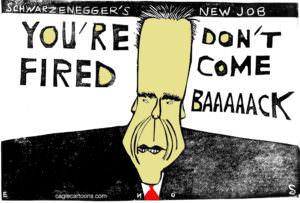California: The State of No
Once again the voters of California, said to be the leading indicators of national trends, have spoken. And what they have said this time is a resounding "No!" to legislative irresponsibility. The megaphone employed was this week's special statewide election to consider six ballot initiatives.
Jules WitcoverOnce again the voters of California, said to be the leading indicators of national trends, have spoken. And what they have said this time is a resounding “No!” to legislative irresponsibility.
The megaphone employed was this week’s special statewide election to consider six ballot initiatives. Five of them were designed to raise money to combat a huge state budget shortfall, and the other one was to bar state salary increases when the state was running a deficit.
Of the six, only the last passed — a clear voter message that was the equivalent of the old movie hero of “Network” urging people to declare they were mad as hell and not going to take it anymore.
A manifestation of the same phenomenon occurred in California and elsewhere around the country with the recent “tea party” demonstrations. Protesters, some impersonating American revolutionaries who dumped imported tea into Boston Harbor, rallied against use of taxpayers’ money to bail out financial and automobile industry giants facing bankruptcy.
While the immediate California revolt was against the state Legislature’s own failure to deal with runaway budget costs, the political message was a broader one. It was a rejection of California’s out-of-control ballot initiative process, designed to address problems the Legislature has repeatedly failed to deal with over the years.
Under the state constitution, dissatisfied voters — and organized special-interest groups — can petition to place questions on the ballot for the electorate to decide. The method is frequently used when the Legislature has not acted or has acted in ways to which a substantial number of petitioners object.
Proponents of the ballot initiative have long proclaimed it the ultimate in democratic action, but critics have increasingly seen it as a costly and destructive end-run around the concept of representative government.
A huge ballot-initiative industry has mushroomed over the years in California, with high-powered lobbying organizations and political consulting firms earning hefty fees for stirring up the animals to wrest lawmaking from the Legislature, or at least to pressure it to act in ways they wish.
In concept, the ballot initiative is supposed to fan genuine public involvement, and sometimes it works that way. The most memorable example was Proposition 13 in 1978, when California voters, stirred by a strong anti-tax public protest, voted to require any property tax increase be approved by two-thirds of the participating electorate. A tax limit of 1 percent of real property was imposed. The measure sought in part to protect older California homeowners whose property values soared in the face of the state’s mushrooming population and resulting housing shortages. Elderly residents on fixed incomes, fearing the loss of their homes for inability to pay their rising property taxes, flocked to the polls to back the initiative.
Proposition 13 drew a California voter turnout of about 70 percent and kicked off a national tax revolt that was often credited for Ronald Reagan’s landslide election to the presidency in 1980. He was a staunch advocate of it, and some other states with the ballot-initiative process followed suit.
But the process has increasingly been open to abuse, with voter participation often low and thus especially vulnerable to expensive lobbying efforts by rival groups. In often bypassing the state Legislature in Sacramento, the process itself has been widely derided as a scandal.
This week’s resounding public rejection of the five initiatives has already stimulated calls for a California constitutional convention to restrict the use of the ballot initiative process. Prop. 13, as it was popularly known, was amended in 2000 to lower the vote needed to approve a tax increase from two-thirds to 55 percent and has been upheld by the U.S. Supreme Court.
Meanwhile, a beleaguered Gov. Arnold Schwarzenegger, who had been seeking a $6 billion federal loan to get through the state’s fiscal crisis, will be huddling with state legislative leaders on necessary budget cuts that will seriously imperil school, health care and human services programs.
In other words, the duly elected officials in California’s executive and legislative branches will be tackling again the budget crisis they should have resolved on their own in the first place — with the voters’ clear disapproval ringing in their ears.
Jules Witcover’s latest book, “Very Strange Bedfellows,” on the Nixon-Agnew relationship, has just been published by Public Affairs Press. You can respond to this column at juleswitcove(at)earthlink.net.
© 2009 Tribune Media Services Inc.
Your support matters…Independent journalism is under threat and overshadowed by heavily funded mainstream media.
You can help level the playing field. Become a member.
Your tax-deductible contribution keeps us digging beneath the headlines to give you thought-provoking, investigative reporting and analysis that unearths what's really happening- without compromise.
Give today to support our courageous, independent journalists.





You need to be a supporter to comment.
There are currently no responses to this article.
Be the first to respond.